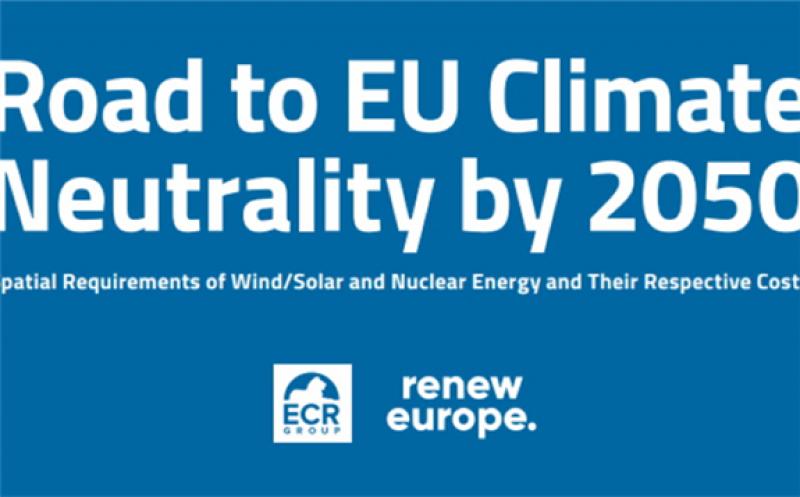The European Union should embark on a "The European Union should embark on a "nuclear renaissance" programme if it is to achieve its climate objectives, a new study on the bloc's climate policy has concluded. if it is to achieve its climate objectives, a new study on the bloc's climate policy has concluded. Commissioned by ECR Group and Renew Europe, the report says it is practically impossible to generate sufficient energy with wind and solar energy as there is not enough available land to meet electricity demand.
 (Image: ECR Group / Renew Europe)
(Image: ECR Group / Renew Europe)
The ECR and the Renew group of the European Parliament commissioned an independent study to assess the effectiveness of EU climate neutrality, and analyse and compare two climate-neutral power-generating technologies that, if they effectively replace fossil fuel infrastructure, can result in decarbonisation of the electricity system - wind/solar and nuclear. The study was initiated by Dutch MEP Rob Roos and Czech MEP Ondřej Knotek and peer-reviewed in part by, among other scientists, Nobel Prize-winning economist William Nordhaus.
The study - Road to EU Climate Neutrality by 2050: Spatial Requirements of Wind/Solar and Nuclear Energy and Their Respective Costs - examined three issues that are key to the EU's ambition to be climate neutral by 2050. These are: the effect of EU climate neutrality on the average global atmospheric temperature by 2050 and 2100; the spatial (land and sea) requirements for wind and solar energy compared with nuclear energy in the Czech Republic and the Netherlands; and, the cost of wind/solar energy and of nuclear energy for these two countries.
The study found that, in realistic scenarios, there is insufficient land to meet all the power demand of the Netherlands - "a country along the North Sea with abundant wind" - and the Czech Republic - "a landlocked country with no access to the sea and a geographically more challenging landscape" - were to rely solely or predominantly on wind and solar power.
It also concluded nuclear energy is more cost-effective than renewables. Even when major efficiency improvements in solar and wind farms are taken into account, nuclear energy will remain the cheaper option in 2050, it said.
"Because current EU policies favour renewable energy over nuclear energy, an assessment of the relative cost of both technologies can easily be led astray and reflect the policy status quo, rather than anything inherent to these technologies," the report says. "Massive funding found its way into the development and deployment of wind and solar energy solutions. This had the effect of reducing the price of renewable energy, but it has also had a relative inflating effect on the cost of nuclear power and of [its] deployment thereof in the EU.
"Given the advantages of nuclear power from spatial and economic viewpoints, however, Member State governments will likely need to add nuclear power to their energy mixes to stay on track in their attempts to meet the EU's climate neutrality objective."
The study also concluded that EU 2050 climate neutrality, if achieved, will likely cause only a very small decrease in the average global atmospheric temperature increase, estimated at no more than between 0.02°C and 0.06°C in 2050, and between 0.05°C and 0.15°C in 2100, assuming no carbon leakage occurs.
Policy changes needed
The study contains several policy recommendations for the European Commission to change its approach.
"The EU is well advised to consider a 'nuclear renaissance' programme. Under this programme, the EU would create a level playing field for all electricity generation technologies. Of course, it would have been preferable had the European Commission itself done a comprehensive cost/benefit analysis of alternative policy options available to pursue the EU's climate neutrality objective," it says. "The fact that no such analysis has been conducted, despite the European Commission's 'Better Regulation', highlights the strong political forces and sense of urgency behind EU climate policy-making."
In a statement, Roos and Knotek said: "We found it remarkable that - in transitioning away from fossil fuels - the EU made a policy decision in favour of renewable energy without considering the relative pros and cons of all carbon-neutral technologies."
Roos added, "Nuclear energy is always available, cheaper and saves the landscape. Moreover, further research into, for example, the thorium molten salt reactor offers enormous opportunities for our export position."
"The EU policies today are discriminatory when it comes to nuclear energy," Knotek said. "It's time for all policy makers to live up to the EU principle of technological neutrality."